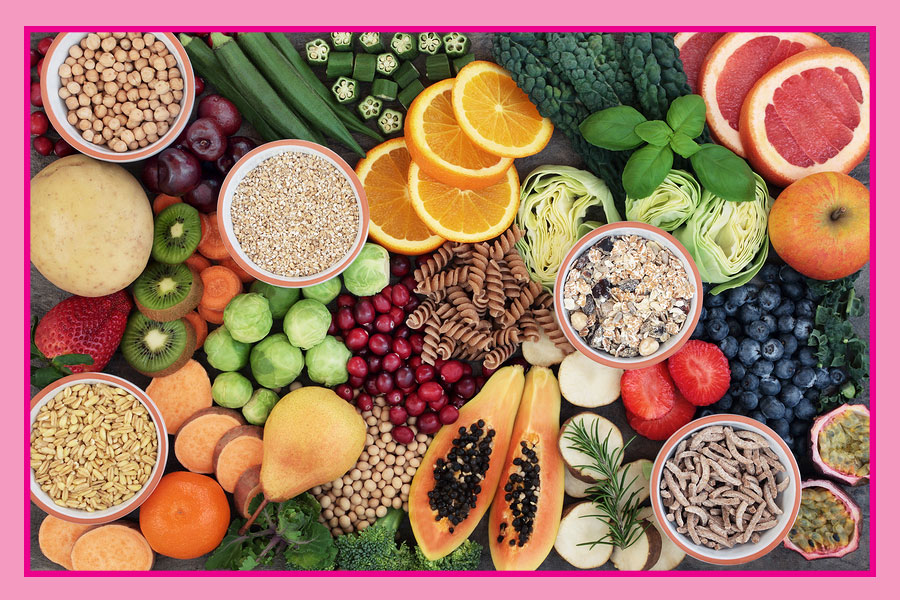Reveiwed by your Fitness Trainers at Century Fitness
Article from John Hopkins Medicine
Guidelines for Healthy Eating
There are no food or dietary supplements that will act as “magic bullets” to prevent breast cancer from returning. National Cancer Institute guidelines for cancer prevention can be used to decrease the chance of a breast cancer recurrence. These guidelines include:
- Increase intake of fruits, vegetables and whole grains
- Decrease fat intake to less than 30 percent of calories
- Minimize intake of cured, pickled and smoked foods
- Achieve and maintain a healthy weight
- Alcohol consumption should be done in moderation, if at all
Fruits, Vegetables and Whole Grains
Fruits, vegetables and whole grains are known to contain phytochemicals with antioxidant, antiestrogen and chemo-preventive properties that may prevent cancer. We recommend five or more servings of fruit and vegetables daily. Cruciferous vegetables (broccoli, cauliflower, kale, cabbage and brussel sprouts) are especially rich in phytochemicals. Extensive research has been conducted at Johns Hopkins Medicine regarding the nutritional value of broccoli sprouts.
Whole grains are unprocessed foods that are high in complex carbohydrates, fiber, vitamins, minerals and phytochemicals. High fiber intake may have a positive benefit by altering hormonal actions of breast cancer and other hormonal-dependent cancers. Daily fiber intake should be 25 to 30 grams of insoluble and soluble fiber.
Whole Foods by Plant Family
Grains
Wheat, rye, oats, rice, corn, bulgur, barley
Green leafy vegetables
Lettuce, spinach, swiss chard, endives, beet greens, romaine
Cruciferous vegetables
Broccoli, cabbage, turnip, brussels sprouts, cauliflower, kohlrabi, bok choy, watercress, collards, kale, mustard greens, rutabaga
Umbelliferous vegetables
Celery, parsley, fennel, carrots, parsnip
Allium vegetables
Garlic, onion, shallots, chives, leek
Legumes
Soybeans, peas, chickpeas, lima beans, peanut, carob, dried beans (kidney, mung, pinto, black-eyed peas), lentils
Solanaceous vegetables
Nightshade family: eggplant, tomatoes
Cucurbitaceous vegetables
Gourd family: pumpkin, squash, cucumber, muskmelon, watermelon
Cancer-Fighting Phytochemicals by Food Source
Sulforaphane
Broccoli sprouts
Isothiocyanates
Mustard, horseradish, cruciferous vegetables
Phenolic compounds
Garlic, green tea, soybeans, cereal grains, cruciferous, umbelliferous, solanaceous, cucurbitaceous vegetables, licorice root, flax seed
Flavanoids
Most fruits and vegetables (cruciferous, garlic, citrus fruits, caraway seeds, umbelliferous, solanaceous, cucurbitaceous vegetables, sage, camphor, dill, basil, mint)
Organo-sulfides
Garlic, onion, leeks, shallots, cruciferous vegetables
Isoflavones
Soybeans, legumes, flax seed
Indoles
Cruciferous vegetables
Carotenoids
Dark yellow/orange/green vegetables and fruits
Fat Intake Recommendations
Controversy exists on the role of dietary fat on the promotion of breast cancer. Some animal studies and epidemiological data have suggested that the type of fat consumed may initiate the development of breast cancer. We recommend that you:
- Limit the intake of highly saturated foods such as beef, lamb, organ meats, cheeses, cream, butter, ice cream
- Decrease (or eliminate) food containing trans fatty acids, such as commercially prepared baked goods, crackers and margarine
- Increase your intake of poultry, fish and vegetarian proteins (legumes and lentils). Increasing your intake of fish to 3 times per week will increase omega-3-polyunsaturated fat intake. Research has suggested that these fatty acids may inhibit the growth of breast tumors.
This article is intended to be provide knowledge of general health and fitness principles and is not medical advice. Please consult with a physician if you have questions.


Recent Comments